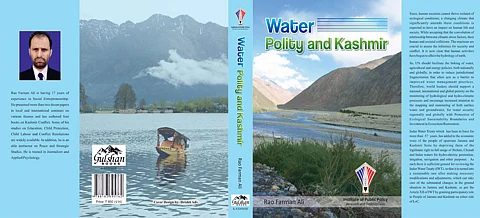

Name of Book: Water, Polity and Kashmir
Author: Rao Farman Ali
Publisher: Gulshan Books
Pages: 401
Price: Hardcover Rs. 900
The book Water, Polity and Kashmir, authored by Rao Farman Ali and published by Gulshan Books, Srinagar in 2018, explores the deeply entwined relationship between water, politics, and the environment, with a particular focus on Kashmir.
At a time when bilateral relations between India and Pakistan are becoming increasingly strained over the Indus Waters Treaty (IWT), this book is more relevant than ever. It highlights how Kashmir lies at the very heart of the water system in South Asia, serving as the point of origin for the major rivers of the Indus Basin.
The author argues that the Indus Waters Treaty, signed in 1960, is now outdated and woefully inadequate in the face of modern climate and geopolitical challenges. He outlines how the rigid division of rivers—allocating the western rivers to Pakistan and the eastern rivers to India—has led to a cascade of disputes, particularly over controversial dam projects such as Kishenganga and Baglihar.
The book also ventures into ongoing debates around new hydroelectric projects, which Pakistan claims are violations of the treaty.
In 2025, India withdrew from the effective implementation of certain provisions of the Indus Waters Treaty, citing Pakistan’s alleged non-cooperation on issues of terrorism and water.
This act, the author would argue, reinforces his warning that water can be wielded as a weapon in political conflict. The book exposes how control over water has enabled India to assert itself as a regional hegemon, particularly through its influence over Kashmir’s rivers.
The author warns that melting glaciers and altered monsoon patterns will make water even scarcer, potentially intensifying tensions between the two countries. The book also examines how damming and agricultural practices are harming both the environment and local communities.
However, some critics argue that the book leans too heavily on the Kashmiri perspective, neglecting India’s developmental needs and Pakistan’s inefficient use of water in agriculture.
As early as 2018, the author predicted the emergence of “water wars”, where water becomes a political tool. With the treaty under strain and Pakistan struggling under increasingly arid conditions, his forecast appears to be coming true. Yet, this is not a book of despair.
It is, in many ways, a book of hope. The author contends that water, instead of dividing nations, could serve as a powerful force for reconciliation—especially in the fight against climate change. Regrettably, this proposition has yet to be taken seriously by either government.
Experts have lauded the book for its synthesis of history, politics, and environmental concerns. It is widely regarded as a seminal work on water politics in South Asia.
Environmentalists, in particular, appreciate its focus on nature and its impact on human lives. On the other hand, some critics feel it does not adequately address the legal and technical complexities of reforming the IWT, and others would have preferred more concrete policy suggestions.
This book is essential reading for anyone interested in the ongoing crisis surrounding the Indus Waters Treaty. It offers a comprehensive treatment of the history, politics, and environmental dimensions of the issue—although at times it may seem somewhat idealistic.
As India and Pakistan confront new challenges, the question remains whether water will be a source of conflict or cooperation. In that uncertainty lies the urgent relevance of this important work.
Have you liked the news article?